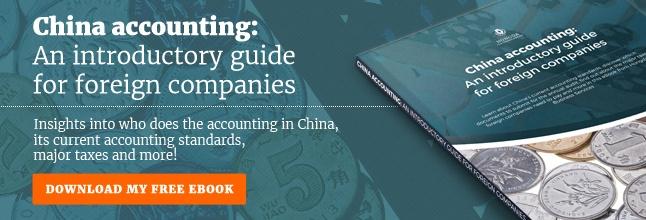
In mid 2015 China accounting changed.
Beijing brought in new rules effectively 'banning' overseas CPAs (Certified Public Accountants) from auditing Chinese firms' books fo their annual accounting audit.
This was due to cases of some foreign CPAs 'illegally' undertaking audits on the Mainland.
This caused some concern in Hong Kong, where many CPAs make a living from auditing Mainland accounts, but the end result was that they were exempted.
How does this affect businesses in China who are bound to require an audit? Keep reading as we explore in more detail...
HK CPAs Are Still In The Frame

It may well be better for certain Mainland firms to instruct an HK CPA to carry out an audit if trust, integrity, and accuracy are important and if the company in question is listed in Hong Kong.
Mainland accountancy firms are also as proficient, but it can be difficult to find the right CPA partner without a prior relationship.
While HK CPAs may still audit Chinese companies, many smaller CPAs from the USA, Europe, and beyond are now effectively blocked from doing so.
Now they must:
- Leave their working documents on the Mainland
- Not use temporary contracts in order to undertake annual auditing
- Audit Mainland companies listed in Hong Kong, with at least half their shares owned by Hong Kong investors
If the company requesting an audit does not fulfill the above criteria then Hong Kong CPAs will need to partner with a mainland accountancy firm. However they can choose to work with any firm with more than 25 certified accountants, instead of the largest 100 accounting companies (as originally suggested). That gives HK CPAs a choice of more than 500 Mainland firms to partner with.
Why Auditing Is An Important Part Of China Accounting
Every Chinese company must undertake an annual accounting audit performed by a CPA who is impartial and not usually employed by the company in question.
This helps Mainland authorities keep companies compliant with tax laws, and aware that they are fulfilling their book keeping and tax obligations. It will also 'red flag' any companies that could be a worry, allowing both the authorities and the companies in question time to correct any issues.
Therefore you, as a Chinese business owner, can see that choosing a CPA who understands your situation and with whom you may enter into dialogue with is important in order to make sure that everything is clear, and that advice is given (if necessary) before a negative report goes to the Chinese authorities.
Learn why you should either outsource or hire an accountant for your China accounting here.
State Secrets

One of the issues now affecting CPAs and the auditing they undertake are China's strict laws against state secrets leaving the country.
This is why their work product is not allowed to leave China.
Some may cynically say that this signifies China's determination to keep results of China accounting a secret, but nominally the reason why auditing results may not cross any borders is due to the fact that the firms being audited may be connected or even owned by the government, and could be engaged in secret work.
According to SCMP:
While Beijing was not willing to relax a ban on accountants taking working papers out of the mainland - a provision linked to broadly defined state secrets - the ministry had agreed to study with other mainland authorities the setting up of a system and procedures that would allow overseas regulators to access such documents in their investigations.
So there are question marks on how easy China will make it for foreign authorities to gain access to details on companies who they are investigating, but as China increasingly makes strides to be more responsible on the world stage it seems hard to believe that they would not comply with requests for help from foreign authorities.
Conclusion
Certain Mainland companies which are listed in Hong Kong may still use HK CPAs for their annual audit. Given the relationship between the companies and Hong Kong this may be advisable for the reasons of clarity, communication, and compliance.
The ways that HK CPAs must work have changed somewhat, and it is also still possible to engage Mainland CPAs for this task too.
Another larger change is that it's highly unlikely that small or medium CPAs from the USA and other places abroad will be able to undertake annual audits on Mainland companies any longer, and so if this is how you used to operate be aware that using an HK CPA is the next closest thing (if you fit the criteria to work with them).





